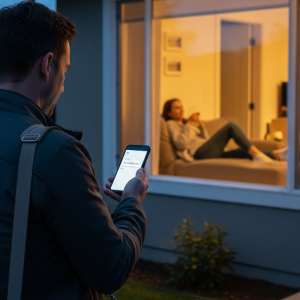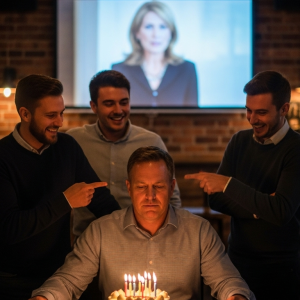I’m twenty now, but the events that defined my childhood crystallized when I was fourteen. My brother, six years my junior, was diagnosed with high-functioning autism at four. To my parents, this diagnosis wasn’t a guide for support, but a license for indulgence. He wasn’t just coddled; he was crowned. He seemed perfectly normal to everyone else, except for a strain of entitlement so profound it was like a gravitational field, bending the entire household around his whims.
Anything I had, he had to have. Our home was a hall of mirrors, filled with duplicates of every toy and gadget. When I was eleven, I spent a year begging for a 3DS. For my twelfth birthday, my wish was granted. The joy lasted mere minutes before the decree came down: I had to lend it to my brother whenever he demanded it, or it would be taken away. And it was, often.
The cycle was only broken when my aunt visited. She witnessed my parents physically pry the console from my hands to appease my brother’s pouting and she let loose on them, her voice cracking like a whip through the living room as she condemned the blatant favoritism. They returned my 3DS immediately, but after she left, they blamed me for the confrontation. A few days later, they bought my brother his own 3DS as a “surprise,” rewarding the very behavior they were shamed for.
His entitlement crescendoed at parties. If the celebration wasn’t for him, he’d erupt. “Why don’t I get any presents?” he’d wail, his voice cutting through the happy chatter. “I want to blow out the candles!” After being asked to leave several parties hosted by our neighbors, my parents learned they couldn’t export their brand of enablement. Soon, the invitations for my brother stopped coming altogether.
My birthdays were my only sanctuary, the one day I was supposed to exist for myself. But on my thirteenth, my parents spent the entire time placating my brother. The moment came for the cake, and my mother leaned in, her voice a conspiratorial whisper. “Honey, would you let him blow out your candles? He’s so upset.”
I refused. I wanted that one small moment for myself.
“You’re being a spoiled brat,” my father snapped, but my aunt, ever the guardian of my dignity, intervened.
“Spoiled?” she echoed, her eyes sweeping from my parents to my sobbing brother. “You call him spoiled? I’ve watched for years as this boy,” she gestured to my brother, “gets everything, while your other son gets the leftovers. And you use his autism as an excuse for lazy, damaging parenting.”
No one else defended them. My brother, realizing he’d lost, tried to spit on my cake, a final act of spite. My aunt moved like lightning, blocking him with her body before scolding him so fiercely he ran screaming to my mother. The rest of the party was a hollow affair, my parents moving like automatons while my aunt took over, injecting a semblance of joy back into the room.
The following year, two weeks before my fourteenth birthday, they sat me down. “We’re still getting you gifts and a small cake,” my mother began, avoiding my eyes, “but we’re canceling the party. It’s just to avoid another… meltdown.”
I couldn’t believe it. They were punishing me for my brother’s lack of control. They just shrugged, as if my feelings were a minor inconvenience. So, I took my story to the only court that might offer justice: school. I told my friends, my teachers, my counselor. The story spread, amplified by social media, until the vice principal himself pulled me aside to offer his sympathy.
The digital backlash hit my parents like a tidal wave. They were inundated with calls and messages from their own friends. “What on earth is wrong with you?” one message read. Their response was to ground me, gaslighting me for “airing our dirty laundry.” It backfired. I simply told everyone at school I was now being punished for being upset that my birthday was unfairly canceled.
Suddenly, I was ungrounded. My dad just walked into my room, arms crossed like a shield over his chest. “Your grounding is over,” he mumbled, refusing to meet my eyes before turning on his heel and leaving. No apology.
I assumed the party was still off. My brother certainly did, gleefully rubbing it in my face. But on the day, a surprise. My parents had booked my favorite restaurant, the one with the small arcade, and invited all my friends. They tried to claim this was their plan all along, but the lie was transparent. I saw it in their strained smiles and the furious, last-minute coordination. My aunt later described my dad’s expression as that of a man who had just watched a flock of moths fly out of his wallet. It was a party born not of love, but of salvaging their shattered reputation.
Even so, it was my day. I got the PS4 I had been desperate for. My brother, predictably, started to make a scene, his face turning purple with rage when the cake arrived. He lunged for the table, intending to push it over, but this time, with a dozen other parents watching, my dad’s hand shot out, grabbing his arm. “That is enough,” he said, his voice low and firm.
For the first time since he was a toddler, my brother got a timeout. My mom had to sit with him, physically restraining him as he repeatedly tried to make a break for the cake or the presents. Eventually, she had to remove him from the party entirely, taking him to a nearby McDonald’s. I later heard it took her an hour to coax him out of the PlayPlace tube.
They never tried to cancel my birthday again. But they never tried that hard, either. For the next four years, my parties were relegated to a local pizza parlor with a generic, undecorated cake. My aunt called them out on it every year. “We forgot to have them write his name on it,” they’d claim. The truth was, my brother refused to eat cake that had someone else’s name on it. But it was still my day. And watching my mother have to escort my tantrum-throwing brother out of the party each year was, in a grim way, its own kind of gift.
When I moved out at eighteen, I took my PS4 with me. The resulting meltdown from my brother was so epic that my parents immediately went out and bought him his own. Without me as a buffer, they were finally forced to confront the monster they had created. On his own fourteenth birthday, he went ballistic when they didn’t get him a PS5. The rampage caused thousands in damages. When I saw my parents last, they looked hollowed out, mentally checked out. My aunt told me they confided in her, whispering their desperate wish to send him to military school, a solution they could never afford. I’d be lying if I said I didn’t find the irony excruciatingly funny.
To understand why my parents so readily canceled my fourteenth birthday, you have to understand the incident at our neighbor’s house. My brother was six or seven. We were dragged along to the party for the boy down the street. I would have rather been home, but my presence was non-negotiable. I spent most of the time bored on a folding chair, which gave me a front-row seat to the entire disaster.
It started subtly. My brother, drawn to the pile of brightly wrapped presents, began picking them up and shaking them violently. The birthday boy’s mother, a woman named Sarah, told him to stop. My parents rushed to his defense. “He’s just curious! He’s harmless,” my mother cooed.
Sarah knew my brother. Her eyes were firm. “Please move him away from the gifts.”
During the party games, my brother fought to be the center of attention. When the birthday boy was, naturally, given the first turn, my brother crumpled. My parents actually approached Sarah. “Could you let our son go first? It would mean so much to him.”
Sarah’s patience was visibly fraying. “No,” she said, her voice tight. “Get your son under control, or I’m going to have to ask all of you to leave.”
Then came the cake. As the candles were lit and the first line of “Happy Birthday” was sung, my brother exploded. He grabbed the edge of the card table and shook it with all his might, rattling the paper plates and cups. My dad held him back while my mother, incredibly, went to Sarah again. I learned later what she asked, a question of such staggering entitlement that it defied belief: she asked if my brother could blow out the candles first, and then they could relight them for her son.
Sarah looked at my mother with pure disgust. “I think it’s time for you to go.”
As they tried to sing again, my brother broke free. He didn’t just push the cake. He clotheslined it, running at the table and heaving the entire sheet cake directly into the birthday boy’s face.
Silence. The room froze. Then, a few kids started to giggle nervously before the birthday boy let out a choked sob, his face masked in chocolate frosting. My mother, instead of being horrified, rushed to hug my brother, turning on Sarah. “See! This could have all been prevented if you’d just let him blow out the candles!”
“GET OUT!” Sarah screamed, wiping cake from her son’s eyes. “GET OUT OF MY HOUSE NOW!”
My brother, feeding on the chaos, then shoved the entire gift table over, sending presents scattering across the floor. I reacted instinctively, grabbing him in a headlock until my father pulled me off.
“Get in the car now, or you’re walking home!” my father yelled, his face purple with rage—not at my brother, but at the situation.
“Fine! I’ll walk!” I shot back.
I stayed. I helped Sarah and the other parents clean up the frosting-smeared floor. Someone was dispatched to buy a new cake. Sarah looked at me, her expression softening. “Thank you,” she said quietly. “You’re a good kid. Your brother… is a menace.” It was the first time an adult had validated what I had known for years.
After the party, she handed me a handwritten invoice for the destroyed cake and a note threatening to call the police, mentioning another parent had recorded the entire incident. I delivered it to my parents. Their faces soured as they read it. They thrust the cash into my hand and told me to take it back to her.
The most disturbing part? This wasn’t a one-off event. At another party months later, the scene repeated. My mother asked if my brother could blow out the candles. They were refused. My brother lunged for the cake. I was ready this time and intercepted him. We were thrown out. After that, the invitations stopped. It was then, I realize now, that my parents decided if other people wouldn’t accommodate my brother, then I would have to. If I couldn’t “share” my own birthday, then I shouldn’t have one at all.
At seventeen, I bought a used minibike with money from my part-time job. It was my freedom, my ticket to and from work. For my brother, it was a new obsession. After the public shaming of my fourteenth birthday, my parents had stopped forcing me to share, which only resulted in more volcanic tantrums from him. He took to breaking things around the house, mostly dishes. My parents started buying plates from thrift stores in bulk.
I refused to let him ride my minibike. He was a whirlwind of destruction. I was the family mechanic for his BMX bike—a top-of-the-line model he’d begged for and then proceeded to abuse. I replaced flats, pedals, handlebars, brake lines. He was careless, leaving it in a neighbor’s driveway where it got run over. He was destructive, breaking the brake line during a tantrum. He was lazy, never bothering to learn the simplest repair. So no, he was not getting his hands on my minibike.
A month before his infamous fourteenth birthday, my parents called, begging me to fix his BMX again. He’d worn the rear tire down to the threads. They offered to pay me, so I went. As I worked, my brother watched, his helmet already on. I finished the job, sat down for a water, and turned my back for a single moment.
That’s when I heard it: the roar of my minibike starting up. He shot out of the garage like a rocket. My parents tried to placate me. “He’ll bring it back,” my father said with a shrug. I wanted to call the police, but I knew they’d dismiss it as a domestic squabble.
An hour later, he returned. The moment he saw me, he gunned the engine and took off again, joyriding until the tank ran dry. My parents had to go retrieve him. They handed me $40 and claimed it wouldn’t happen again. “It better not,” I warned, “or I swear I’m calling the cops next time.”
I told them, “If he wants one so badly, get him one.”
And then, the breathtaking hypocrisy. “Absolutely not,” my mother said, aghast. “It’s practically a motorcycle. It’s too dangerous. He’s not responsible enough.”
This brings us to the aftermath of his birthday rampage. The broken furniture, the shattered electronics, the final, undeniable proof that they had created a monster. Someone suggested online that they should sell his things to recoup the losses. When I relayed the idea to my parents, I was shocked by how readily they agreed. It was like a lightbulb finally flickered on in a dark, dusty room.
That weekend, they held a garage sale. They sold everything. His bike, his TV, his drone, his RC cars. They sold his mountain of video game systems: GameCube, Wii, 3DS, Switch, every PlayStation and Xbox he owned. I watched as years of indulgence were carted away for a few dollars here and there. I could hear my brother sobbing in his room, the fake, theatrical crying I knew so well. This time, it had no effect. His gaming PC was next, listed online. They stripped his room down to the essentials: a bed, a dresser, and a cheap laptop for schoolwork, to which he was denied access for anything else.
The family could no longer ignore the crisis. My aunt, a force of nature, helped me organize an intervention. We gathered in the living room, a circle of chairs forming a tribunal. My parents tried to interject as my aunt delivered a blistering, pre-written speech, but they were silenced. When it was my turn, I read my own speech, laying out years of neglect, favoritism, and pain. My grandparents spoke next, then others, each story adding another layer to the crushing weight of their failure. My mother dissolved into tears, my father holding her as she finally, truly broke. “We were terrible parents,” she sobbed. “We ruined your childhood.”
“It should not have taken this,” my aunt stated, her voice resonating with cold authority, “for you to see your own hypocrisy.”
Then, they brought my brother into the room. He fought back with his usual excuses—”If you’d just let me have my way!”—but this time, the words fell flat. The whole room countered him, a chorus explaining that the world does not, and will not, bend to his will. He looked to our mother for rescue, but she wouldn’t meet his gaze. He began to hyperventilate, then fell to the floor in a dramatic faint.
“Stop milking it and get up,” my aunt said, unimpressed.
He screamed, “You’re all ruining my life! I wish you were all dead!”
My parents were horrified. We all were. We left him there on the floor as, one by one, each person said their piece directly to him. Eventually, everyone left. My parents had to drag his limp, uncooperative body back to his room. For the first time, he had faced a world without sympathy, and he didn’t know how to handle it.
The intervention was a seismic shock, but the aftershocks were what truly fractured our family. My father held firm, committed to my brother’s new, disciplined reality. My mother, however, secretly crumbled. Out of a misguided sense of pity, while my dad was at work, she started giving in. It began small, but my brother, sensing weakness, pushed for more and more. She bought him a used Nintendo Switch, letting him play it in secret. She let him use his laptop to go online. When he demanded she replace the expensive items they’d sold, she refused, terrified my dad would find out.
His demands escalated into verbal abuse, then into threats. One afternoon, he got violent. My mother, pushed past her absolute limit, hit her breaking point. She slapped him, hard, across the face. The shock of her own action, combined with years of repressed guilt and stress, triggered a complete mental breakdown. She began hurting herself.
She called my dad, her words incoherent. He rushed home to a scene of utter horror. My brother was huddled in a corner, stunned and terrified. My mother was… gone. Not physically, but mentally. Dad told me later he had to physically restrain her to stop her from harming herself more. He blamed my brother, and in a fit of rage, punished him more severely than he ever had in his life, unleashing all his pent-up frustration. He found the hidden Switch and smashed it.
My mother was hospitalized for a psychiatric evaluation. The diagnosis was severe stress and anxiety. Dad showed me a photo before she was admitted. Her face was swollen, her eyes bruised, and patches of her hair were missing. He begged me to come watch my brother, terrified of what might happen next.
I found my brother in his closet, a small, trembling figure. He flinched when I touched him. I ordered his favorite pizza—barbecue chicken with stuffed crust—and coaxed him out. We ate in a heavy, awkward silence. Later, we played Mario Kart on the old N64. In the dim glow of the CRT screen, he finally broke down, his body wracked with deep, shuddering sobs.
“How bad of a person am I?” he whispered.
I hesitated, choosing my words carefully. “Being spoiled wasn’t your fault. That was on Mom and Dad,” I began. “But you’re getting older now. You can’t put all the blame on them anymore. You’re entitled, you can be violent, you steal, and you blame everyone else for your problems. You need help.”
He cried more, but he listened. He asked me what it was like to be an adult. I told him about my job, about rent, utilities, gas, and the small amount left over for myself. He looked shocked, as if the concept of consequence was a foreign language he was hearing for the first time.
“I don’t want to be an adult,” he admitted quietly.
“I know,” I said. “You like having your way. But you know that’s not how it works.” He nodded. We talked until my dad’s car pulled into the driveway. My brother bolted back to his room.
My dad was a wreck. He fell into my arms, sobbing like a child. “I’m starting to understand,” he choked out. “I’m just now starting to see how awful I’ve been. I was so blind.”
It’s been nearly two weeks. Mom hasn’t come home. Dad won’t say much, but I suspect she’s been institutionalized, labeled a danger to herself. My brother is subdued. He does his chores without complaint. He’s afraid of Dad, but he says Dad hasn’t raised his voice since that terrible day. He misses his old life, his games, his bike. He’s starting to understand how to behave, but this brutal lesson may have scarred us all permanently. The drama I thought would bring change has come,




